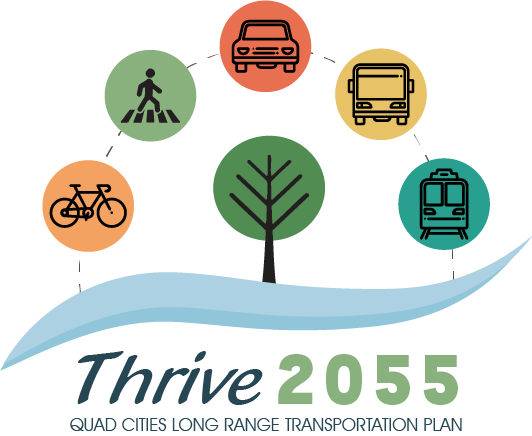- Details
- Written by: Sarah Grabowski
- Category: Transferred From Old Site
- Hits: 3773
August 24, 2016 – The National Association of Development Organizations (NADO) named Bi-State Regional Commission the winner of a 2016 Innovation Award for fostering intergovernmental relationships. This effort will be honored at the NADO Annual Training Conference in San Antonio in October.
- Details
- Written by: Sarah Grabowski
- Category: Transferred From Old Site
- Hits: 6584
August 26, 2015 – Executive Director Denise Bulat stressed the importance of a healthy region because health affects all parts of a community, including work, environment, education, agriculture, food production, water and sanitation, housing, and health care. Health is 60% lifestyle, behavior, society, and environment, and government affects these factors. Some of the key activities in the region are alternative transportation planning and coordination, land-use and environmental planning, participation in health initiatives, and coordination of topical issues.
- Details
- Written by: Sarah Grabowski
- Category: Transferred From Old Site
- Hits: 4099
 August 24, 2016 – In 1962, the new Federal-Aid Highway Act required transportation planning in metropolitan areas, and Bi-State Metropolitan Planning Commission was created in 1966 to meet those transportation planning needs in the Quad Cities Metropolitan Area. Since then, the now Bi-State Regional Commission has expanded its services to member governments in the five-county Bi-State Region.
August 24, 2016 – In 1962, the new Federal-Aid Highway Act required transportation planning in metropolitan areas, and Bi-State Metropolitan Planning Commission was created in 1966 to meet those transportation planning needs in the Quad Cities Metropolitan Area. Since then, the now Bi-State Regional Commission has expanded its services to member governments in the five-county Bi-State Region.
Services in addition to transportation planning include economic development planning, community planning, intergovernmental programs, data and information services, GIS/mapping services, graphic design services, and administrative assistance. A detailed list of services is available by clicking here.
- Details
- Written by: Sarah Grabowski
- Category: Transferred From Old Site
- Hits: 6504
July 22, 2015 – Ms. Erika Witzke and Mr. Alan Meyers from Cambridge Systematics, Inc. presented the status of the Bi-State Region Freight Commodity Efficiency Plan to the Commission. The project was initiated 10-months ago to inventory the freight transportation system in the five-county Bi-State Region, assess needs, analyze commodity flows, report findings, and make recommendations for improving the freight transportation system. As part of the assessment, the consultant team utilized the stakeholders committee, industry interviews and a workshop to solidify study recommendations.
- Details
- Written by: Sarah Grabowski
- Category: Transferred From Old Site
- Hits: 18097
January 25, 2017 – The Interstate 74 Bridge Corridor project involves the replacement of the I-74 Bridge and nearly eight miles of corridor improvements. It has been the number one transportation priority in the Bi-State Region since 1998. It is in need of reconstruction due to crashes, recurring congestion, and significant maintenance. The bridge itself is functionally obsolete with no shoulders. The Iowa-bound span was built in 1935 and the Illinois-bound span in 1959.

expanded lanes and shoulders
The Central Section of the I-74 Bridge Corridor project from south of Avenue of the Cities to Middle Road has been value engineered to reduce costs and the construction period from 8 to 3.5 years. Design plans are complete for the entire central section, which includes the entire Illinois portion of the project. The Iowa portion of the project north of Middle Road to 53rd Street is 3.5 miles in length and is an independent project. The design for the North Section started in 2016 and should be completed by 2018.
- Details
- Written by: Sarah Grabowski
- Category: Transferred From Old Site
- Hits: 1410
Illinois Department of Transportation is asking for feedback on the Illinois statewide Long Range Transportation Plan Goals. The following link connects to this survey: http://apps.dot.illinois.gov/Checkbox/Survey.aspx?s=c6649fca145b4c9d986e49310dad579e
The draft goals focus on Economic Growth, Livability, Access, Resilience, Stewardship and Safety. The plan is anticipated to be drafted by late 2017.
- Details
- Written by: Sarah Grabowski
- Category: Transferred From Old Site
- Hits: 6775
June 24, 2015 – Nick Cusick of the Muscatine County Convention and Visitors Bureau reported that in 2013, tourists spent $76,950,000 in Muscatine County and generated $91,000 in local tax receipts. The Muscatine tourism industry employed 670 in the county.
Formerly a part of Greater Muscatine Chamber of Commerce and Industry, the Muscatine Convention and Visitors Bureau was reorganized by the City of Muscatine in 2013 to become an independent organization with an 18-member board. Twenty-five percent of Muscatine hotel/motel tax is dedicated to the bureau. For the first time, this allowed for a full-time staff member. On June 8th of this year the board voted to dissolve the corporation and move toward becoming a department of the city of Muscatine, but it will function the same as it has for the past two years but with a seven-member advisory board.
- Details
- Written by: Sarah Grabowski
- Category: Transferred From Old Site
- Hits: 8761
- Details
- Written by: Sarah Grabowski
- Category: Transferred From Old Site
- Hits: 10023
May 27, 2015 – Denise Bulat, Executive Director, reviewed the draft FY 2016 Budget as recommended by the Finance and Personnel Committee. She reported revenues for FY 2016 are projected to be down 4.7% from the current year, primarily due to the completion of the Henry County Rural Jobs Accelerator grant. Dues for Bi-State’s member governments are proposed to increase 2.0 %. Of member dues, 59.8% of dues go to match federal and state grant funding. Continuation of the merit performance review program, with a projected average of 2.0%, is recommended along with a 1.5% across the board annual wage adjustment budgeted. The budget will lay on the table and be considered for approval at the June 24, 2015 Commission meeting. Anyone with questions or comments about the budget, or to request a budget document, should call Denise Bulat at 309-793-6302 ext. 140 or Donna Moritz at 309-793-6302 ext. 128.
- Details
- Written by: Sarah Grabowski
- Category: Transferred From Old Site
- Hits: 7720
May 27, 2015 – Quad City Health Initiative (QCHI) partnered with Bi-State Regional Commission (BSRC) on a Centers for Disease Control and Prevention (CDC) Partnerships to Improve Community Health (PICH) Grant to expand upon the work under the Be Healthy QC initiative. The PICH Grant focuses on improving nutrition options and increasing physical wellness opportunities for people, especially children, in the Quad Cities.


